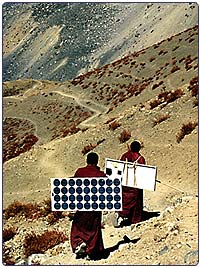Religious Groups Adopt ‘Green Rule’
By Kathryn Young | Sep 19, 2007

Solar panels aren’t mentioned in the Anglican Book of Common Prayer, so Rev. Margaret Cornish has had to write her own blessing for a special dedication service on Sunday.
As she climbs on to St. Alban’s Anglican Church roof in Richmond, B.C., she plans to ask that "the blessed sun shine on us and warm these panels, our hearts and this sacred place."
Solar panels are joining the crosses that adorn Christian churches, as well as a Hindu temple’s parking lot lights and possibly a Calgary synagogue and Toronto mosque as faith groups across Canada act on the so-called Green Rule: "Do unto the Earth as you would have it do unto you."
Cornish said her solar panels are "an outward and very visible sign that we are deepening our commitment to important environmental issues."
Congregations are also caulking air leaks, reducing garbage, conserving water, and installing rain barrels, compact fluorescent light bulbs, energy efficient furnaces and appliances — all in an attempt to live out their common belief that humans need to care for their planet.
"It’s a whole nascent movement, a green faith movement," said Rory O’Brien, program coordinator of the Greening Sacred Spaces program run by the ecumenical group Faith and the Common Good, that has a network of affiliates in B.C., Alberta, Ontario and Nova Scotia. "We were really taken aback by the interest out there."
In Ontario, Sacred Spaces is involved with 77 congregations, half Christian and half Muslim, Jewish, Hindu, Sikh, Buddhist, Bahai, Unitarian, Zen, and Hare Krishna.
"People want to be a part of it, they just don’t know how to do it," added Julie Hrdlicka, Calgary co-ordinator of Faith and the Common Good. "We’re the middlemen, connecting the faith communities with the experts that do the auditing and the retrofitting."
Faith groups must offer green leadership, said David Dranchuk, co-ordinator of societal ministry for the Anglican Diocese of New Westminster in B.C., which asked its 80 churches to set goals for reducing greenhouse gases.
It also helped St. Alban’s and four others with solar hot water systems plus another church with photovoltaic panels to generate electricity.
"We can never do enough," Dranchuk said. "It’s incumbent on all faith communities to offer some leadership in this area, because if we have nothing to say about the environment, really, of what practical use are we?"
Greening a building starts with an energy audit that examines every nook and cranny to see how energy costs can be reduced. Sacred Spaces will pay for audits — which cost several thousand dollars depending on building size — as long as congregations commit to matching that amount in energy retrofits.
Sacred Spaces paid the $4,000 audit on the schools and mosque that make up the Islamic Foundation of Toronto. Recent high-school grad Azba Hathiyani, president of the green committee, said they’re now examining the results, but expects water savings will head their list. With prayer services five times a day, and up to 1,000 people attending on Fridays, water use is high since everyone cleanses themselves beforehand.
"We’re washing the hand, mouth, nose, face, arms and feet," explained Hathiyani. The audit recommended low-flow or automatic shut-off taps in the four ablution rooms. "There’s a lot of emphasis on water conservation in our religion as well, so that’s why we’ve made that the primary focus."
She also hopes to mount solar panels on the high school building, install programmable thermostats, upgrade to Energy Star kitchen appliances, and reduce the number of photocopiers and computers.
O’Brien said the average cost for a whole-building retrofit is about $50,000, but a congregation could then save $8,000 per year in energy costs.















